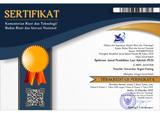The Relationship Between Parental Guidance And Student Learning Discipline During Pandemic Covid-19
 ), Setiawati Setiawati(2),
), Setiawati Setiawati(2), (1) Universitas negeri Padang
(2) Universitas Negeri Padang
 Corresponding Author
Corresponding Author
DOI : https://doi.org/10.24036/spektrumpls.v10i1.114934
Full Text:
 Language : en
Language : en
Abstract
The background of this research is the low discipline of students during online learning during the COVID-19 pandemic at SMA Pertiwi 1 Padang. Allegedly caused by the lack of parental guidance for children when studying from home, this study aims to: 1) describe parental guidance; 2) describe student learning discipline; 3) see the relationship between parental guidance and student learning discipline during the covid 19 pandemic.This research is a quantitative correlational study. The population in this study were all students of SMA Pertiwi 1 Padang in class X and class XI, which amounted to 521 students and 78 students were used as research samples using stratified random sampling technique. The data collection technique used a questionnaire, the data obtained were analyzed using descriptive analysis and the product moment correlation formula.The results of this study indicate: 1) parental guidance is categorized as low dominant 2) student discipline is categorized as low; 3) there is a significant relationship between parental guidance and student learning discipline during the covid 19 pandemic at Pertiwi 1 Padang High School. The research suggestions are: 1) it is hoped that formal school educators will pay more attention to student learning activities while online 2) it is expected that parents can guide their children in studying at home so that children can obtain maximum learning outcomes; and 3) it is hoped that further researchers will find or examine other variables that affect learning discipline, especially when studying from home.
Keywords: Parental Guidance, TutoringReferences
Aini, W., Setiawati, S., & Pamungkas, A. H. (2019). The Creativity of the Early Childhood Education’s Teachers in Creating an Animation Media Web-Based in Koto Tangah Padang. KOLOKIUM: Jurnal Pendidikan Luar Sekolah, 7(2), 127–134. https://doi.org/10.24036/kolokium-pls.v7i2.355
Benny Prasetiya, Aries Dirgayunita, S. H. (2019). Bimbingan Orang Tua, Kedisiplinan dan Kosntribusinya terhadap Pencegahan Perilaku Menyimpang. Jurnal Shautut Tarbiyah, 25(2), 221–238.
Daryanto, D., & Darmiatun, S. (2016). Implementasi Pendidikan Karakter di Sekolah. Yogyakarta: Gava Media.
Irzan, T., & Enceng. (2016). Hubungan Kemandirian Belajar dan Hasil Belajar pada Pendidikan Jarak Jauh. Jurnal Pendidikan Terbuka Dan Jarak Jauh, 7(2), 91–101.
Ismaniar, I., Jamaris, J., & Wisroni, W. (2019). Improving Early Reading Ability Using Environmental Print Approach in the Family. Advances in Social Science, Education and Humanities Research, 293(Non Formal Education International Conference (NFEIC 2018)), 52–55. https://doi.org/10.2991/nfeic-18.2019.11
Jamaluddin, J., Komarudin, A., & Rahman, A. A. (2019). Bimbingan Orang Tua dalam Mengembangkan Kepribadian Anak. Atthulab: Islamic Religion Teaching and Learning Journal, 4(2), 170–184. https://doi.org/10.15575/ath.v4i2.5575
Margono, M. (2007). Metode Penelitian Pendidikan. Jakarta: Rineka Cipta.
Rahmadani, W., & Ismaniar, I. (2019). Description of Parent’s Support on Development of Early Reading Skills. SPEKTRUM: Jurnal Pendidikan Luar Sekolah (PLS), 2(1), 29. https://doi.org/10.24036/spektrumpls.v2i1.101583
Rilasti, V. W., & Jalius, J. (2018). Hubungan antara Kontrol Sosial Orang Tua dengan Perilaku Menikah Muda pada Remaja di Mandahiliang Kenagarian Koto Laweh Kecamatan Lembang Jaya Kabupaten Solok. SPEKTRUM: Jurnal Pendidikan Luar Sekolah (PLS), 1(4), 489. https://doi.org/10.24036/spektrumpls.v1i4.101718
Setiawati, S. (2019). The Role of Character Education in the Family. Advances in Social Science, Education and Humanities Research, 293(Non Formal Education International Conference (NFEIC 2018) The), 93–95. https://doi.org/10.2991/nfeic-18.2019.20
Setiawati, S. (2020). Family Role in Children’s Social Development. Advances in Social Science, Education and Humanities Research, 405(1st Int. Conf. Lifelong Learn. Educ. Sustain. (ICLLES 2019)), 159–162. https://doi.org/10.2991/assehr.k.200217.033
Setiawati, S., & Aini, W. (2019). Increase Adult Learning Motivation through Promotion of Their Needs. KOLOKIUM: Jurnal Pendidikan Luar Sekolah, 7(2), 111–119. https://doi.org/10.24036/kolokium-pls.v7i2.36
Sugiyono. (2016). Metode Penelitian Kuantitatif, Kualitatif, dan Kombinasi (Mixed Methods). Bandung: Alfabeta.
Sugiyono, S. (2017). Metode Penelitian Kuantitatif, Kualitatif, dan R&D. Jakarta: Alfabeta.
Tu’u, T. (2004). Peran Disiplin pada Perilaku dan Prestasi Siswa (1st ed.). Jakarta: Grasindo.
Undang-Undang Republik Indonesia No 20 Tentang Sistem Pendidikan Nasional. (2003). In Jakarta: Direktorat Pendidikan Menengah Umum.
Yusuf, A. M. (2014). Metode Penelitian Kuantitatif, Kualitatif & Penelitian Gabungan. Padang: UNP Press.
Zuhrina, Z., Jamaris, J., & Irmawita, I. (2018). Hubungan Pengalaman Orang Tua dengan Perilaku Belajar Aanak di Rumah di Kuamang Kecamatan Lembah Melintang Kabupaten Pasaman Barat. SPEKTRUM: Jurnal Pendidikan Luar Sekolah (PLS), 1(1). https://doi.org/10.5281/zenodo.1186501
 Article Metrics
Article Metrics
 Abstract Views : 287 times
Abstract Views : 287 times
 PDF Downloaded : 110 times
PDF Downloaded : 110 times
Refbacks
- There are currently no refbacks.

This work is licensed under a Creative Commons Attribution-NonCommercial 4.0 International License.



